Looking to find a book editor?
In this article, I’m going to walk you through the process of hiring an editor without overpaying, choosing the wrong person, or getting stressed out.
Whether you are looking to hire an editor, book cover designer, book interior designer, ebook formatter, proofreader, web designer, or other type of freelancer, you can use this same process to pick the right person for the job.
Finding great editors or freelance contractors isn’t easy, and there are a lot of ways you can mess it up by paying too much or hiring the wrong person. Hiring an editor can be incredibly expensive, frustrating, and disappointing when things don’t work out as planned.
I know many authors who self-published a “professionally edited” book that was still plagued by typos, mistakes, and poor organization.
“Hiring an editor is NOT the key to creating a great book. Hiring the RIGHT editor is the key.”
That’s why you need a system to make sure you do everything you can to pick the right editor for your specific book project.
How to Find a Book Editor
Let’s walk through the 8 steps to finding and hiring the right editor.
Step 1. Find Editors and Freelancers Online
There are hundreds of websites you can use to find literally hundreds of thousands of editors, book designers and contractors of all kinds and experience levels.
Here are the top sites I highly recommend you use when starting out in order of importance:
How to Choose a Freelancing Site to Post Your Job
Upwork is the biggest website in the world created specifically to connect freelance contractors with small businesses, entrepreneurs, authors, and artists. With an Alexa Rank of 415, it is the 415th most visited website in the world and has over 12 Million freelancers registered with the site.
Guru.com and Freelancer.com are both much smaller, and I only use them now when I can’t find exactly what I’m looking for on Upwork.com.
Consider using these two freelancing sites as your backup plan, and focus on Upwork.com when you first start looking for an editor or freelancer.
Step 2. Post Your Project or Job Online
Now that you know where to find 12 Million+ freelancers who are ready to help with your project, it’s time to post your job so that these freelancers can apply to do the work for you.
Once you create your account at Upwork and fill out your profile, just click “Post a Job” at the top of the website.
After you do that, you’ll come to a page that looks like this:
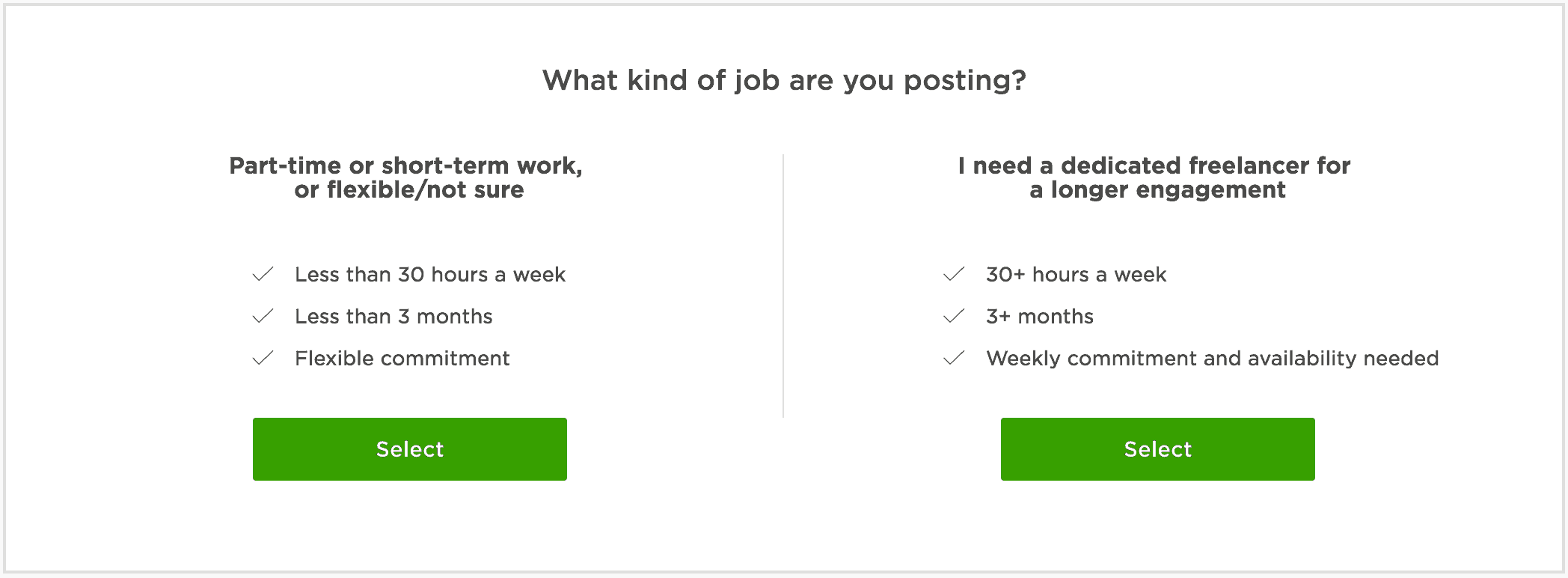
If you just need an editor or book designer or web designer for one book project, select the part-time option on the left. If you’re looking for someone to work for you at least 30 hours a week for at least 3 months, select the option on the right for longer engagements.
Once you select the right option, it’s time to select the category and subcategory that describe the kind of work you’re looking for.
Here’s what the job categories on Upwork look like:
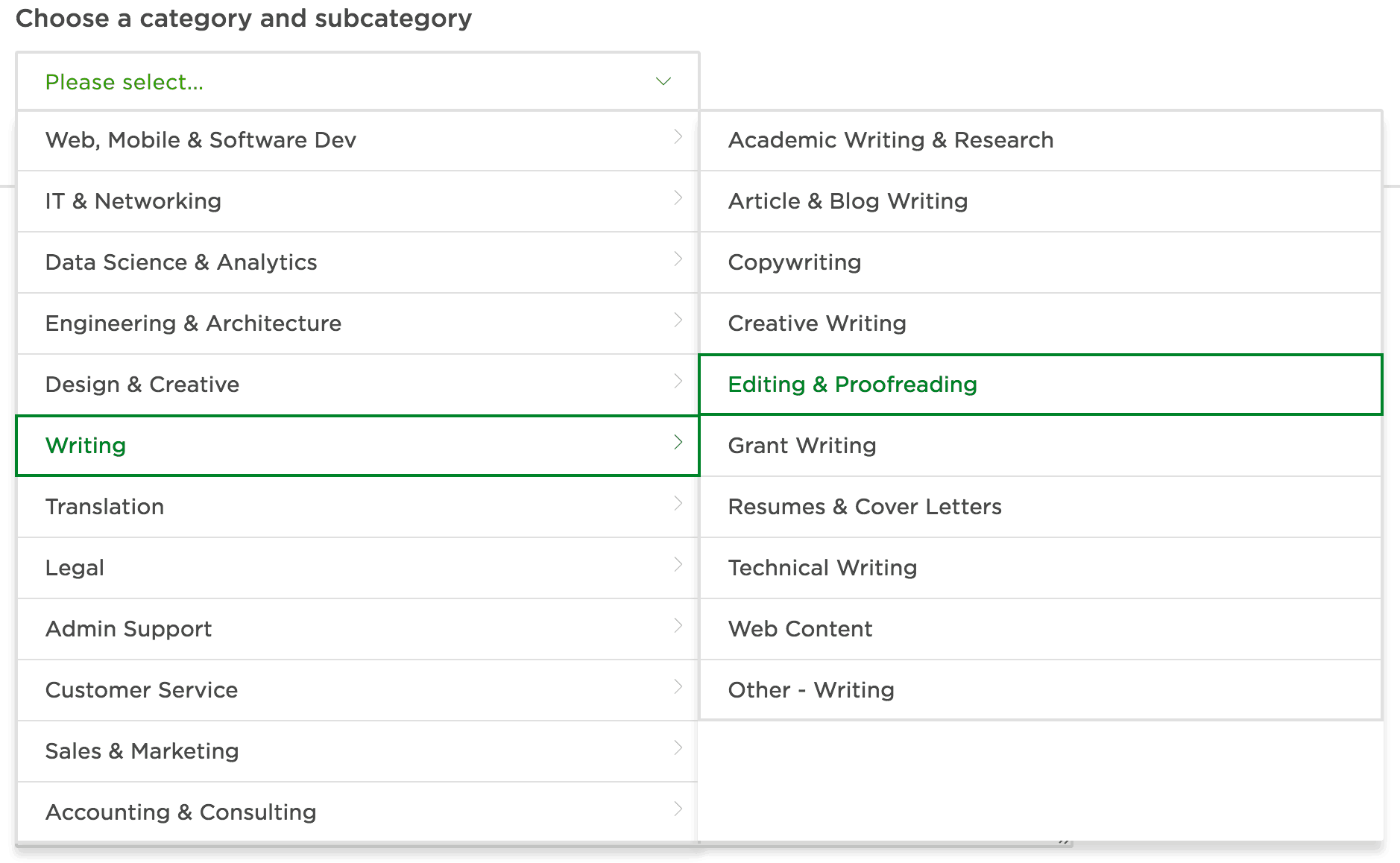
You may not find an exact match for the type of work you need, but do your best to make sure you pick the most relevant category so you can find the most experienced freelancers to help with your project.
Here are some of the most common categories we have used at TCK Publishing to help with some of our publishing projects and marketing work:
- Writing > Editing & Proofreading (for finding editors, proofreaders and the occasional ghostwriter)
- Web, Mobile & Software Development > Web & Mobile Design (for website design work)
- Design & Creative > Graphic Design (for finding book cover designers and graphic designers for various projects)
Once you’ve selected the right category, it’s time to name your job posting:

When you name your job posting, make sure to be as specific as possible so that you can attract the right freelancers and automatically weed out contractors who are not a good fit for your project.
Posting something generic like “Looking for an editor for my book” is a bad idea because you will end up getting tons of freelancers applying who may edit fiction when you have a non-fiction book, or vice versa.
Try to include as much detail as you can when selecting a name for your job.
Writing the Job Description
Next, it’s time to write a job description to clearly explain what kind of work you need done and what kind of freelancer would be a good fit for your project.
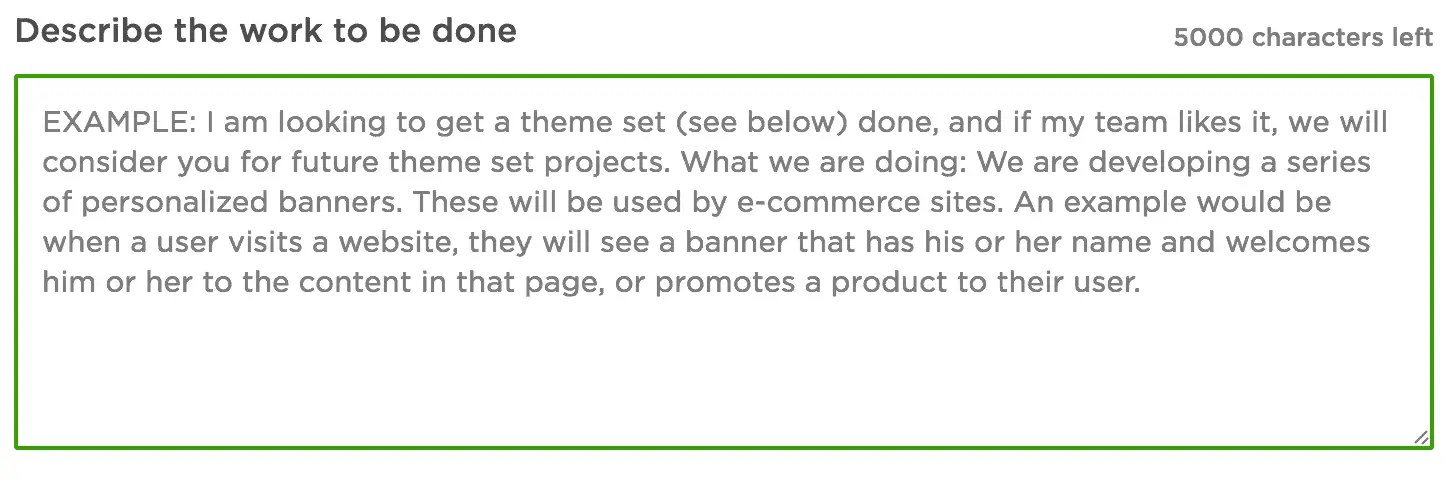
Here’s a recent job description we posted on Upwork that turned up some very good editors for us:
TCK Publishing (www.tckpublishing.com) is looking to hire part-time editors to work on several romance novels, adventure stories and historical romance novels. Most of our titles in these genres will be in series of 3-7 books or more.
We are looking for the following types of editing skills:
Developmental editing (rarely necessary, but useful if you have the skills)
Content editing
Line Editing
Copyediting
Proofreading
You must have significant editing experience in at least one or more of these genres, preferably working with a major trade publisher:
Romance
Historical Romance
Adventure
Science Fiction/Fantasy
Mystery
Please send us:
Your experience and background as an editor
A list of titles you have edited, preferably with links to Amazon or another retailer so we can review your work
A list of references
A description of the kind of editing where you feel you would most excel and most enjoy your work
Note:
Yes, we are looking for non-fiction editors and ghostwriters as well, so feel free to apply if that’s the kind of work you do. Please specify that in your submission and provide us with enough detail so we can follow up with you after looking into your experience.
What to Include in Your Job Description
Here are some things you’ll definitely want to include in your job description:
- Who you are and what you do
- The exact kind of work you’re looking for (such as developmental editing for a romance novel instead of editing in general)
- The type of experience level you require for the job
- Ask for a list of references
- Ask to see a portfolio or examples of past work (most good freelancers on Upwork will have a portfolio or past work samples listed in their profile, so you can check that out when reviewing applicants)
Next, you’ll need to enter the skills needed to do the job. This is where you can laser target your job posting to only attract freelancers with the exact skills you need.

When you start typing in the “Enter skills needed” box, Upwork will automatically suggest skills based on what you’re typing so you can see the skills that are available on the site. You can only select from skills that already exist on the site. For example, if you type in “Book Cover Designer,” you will get an error message. Instead, when you start typing in “Book Cover,” Upwork will pop up with the suggestion for “Book Cover Design”—just click that suggestion or hit enter, and it will appear in the box.
Make sure only to include skills here that are absolutely necessary for the job. Freelancers who don’t have the skills you list in the job description will not be able to apply, so if you add irrelevant skills (like Web Design when you only need a book cover designer) you will miss out on some potentially excellent freelancers.
If you’re looking for an editor, type in Editing or Developmental Editing or Proofreading, depending on what you need.
How to Pay an Editor
Next, you must select how you want to pay your freelancers, either as an hourly rate or a fixed price per project. I recommend a fixed price for most projects so that you can estimate your exact costs ahead of time, rather than paying an hourly rate and not knowing how much it’s actually going to cost you until the work is done.
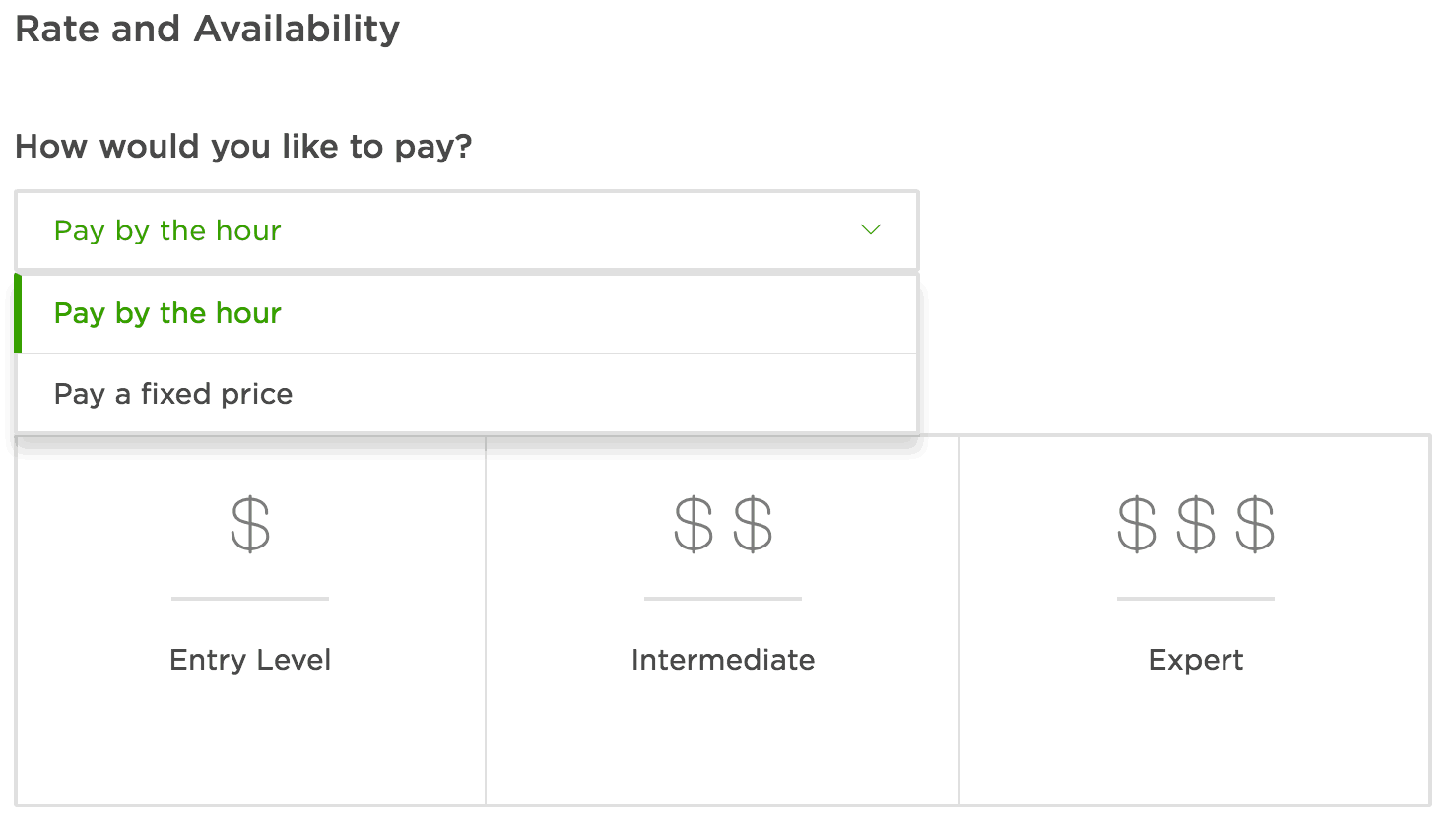
Other Options
There are a few more options you can select to customize your posting, such as requiring a cover letter or adding screening questions. None of these are necessary, but feel free to use them if you think it will help you find a better freelancer for your job.
Step 3. Invite the Best Editors to Apply
Once you’ve filled out all the information above and posted your job listing on Upwork, you’ll be able to invite top freelancers to apply for the gig.
Upwork will recommend top editors or freelancers based on the category, job skills and pricing options you selected when filling out your job posting. I highly recommend going through and inviting at least 5-10 top pople you think would be a good fit for your job.
I have talked to many top freelancers on Upwork, and the best of the best usually never apply for jobs—they only consider work they have been invited to. So, if you want to work with the best people, you need to invite them to work with you!
Step 4. Review Editing Proposals
Once you have posted your job and invited a few top freelancers, you should start seeing editors applying to work with you within 24 hours.
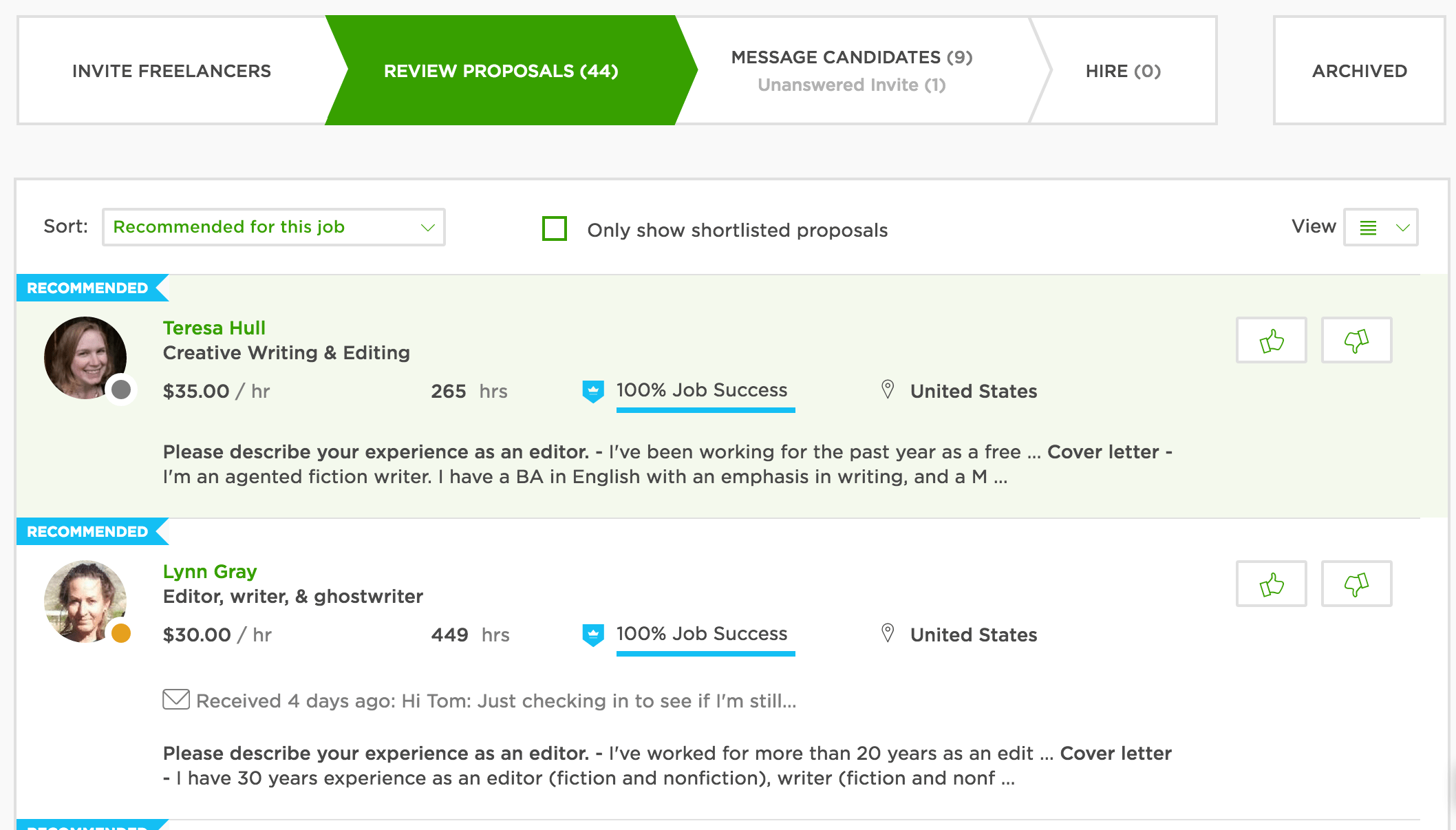
Here are a few things you should consider when reviewing applications from editors on Upwork:
Job Success Rate
I look for 90%+ Job Success. Anything less is a definite no. Anything below 95% goes in the “maybe” column.
Work Experience
There are a lot of editors out there with no actual editing experience working with a publishing company, newspaper, journal, or other business that requires a high level of expertise and provides training for editors. Without working in such a position, it’s very difficult to obtain and master the skills required to become a great book editor. It’s not impossible, but it is unlikely.
I always look for and prefer working with editors who have experience working with a publishing company or newspaper or similar business where they were well-trained and their work was constantly being put to the test with at least one other editor working closely with them.
Read Their Profile
The profile on Upwork for editors is very much like an essay, and it can provide a great way to see how well they can communicate with the written word.
I always read it thoroughly and make sure there are no glaring typos, grammatical errors, or sentences that are confusing, unclear, or disorganized.
If the editor’s bio is poorly written or contains several errors, you can be fairly confident that they will not do a great job helping you improve your writing or fixing errors in your manuscript.
Check Their Work History
Next, I check their work history to see what kind of projects they have been working on. For example, if I’m hiring an editor and I see that 8 out of their last 10 projects had nothing to do with editing, I will probably pass because it means they either don’t enjoy editing work or they aren’t able to find enough of it on Upwork, which should not be a problem for a highly skilled editor.
Sending a Message Test
If everything checks out, I will then proceed with a message test. I simply send the editor a quick note via Upwork that says something like this,
“Hi Laura,
It sounds like you may be a great fit to edit our upcoming self-help book. Please send me an email at [email protected] and we can discuss our editing needs in more detail.
Thanks,
Tom”
I send this message in order to 1) test if they respond quickly and 2) take the conversation to my email inbox where I can more quickly and easily connect with them, exchange phone numbers or Skype details, and schedule a call to connect.
Step 5. Schedule a Call with the Editor
If the editor passes the Message Test, it’s time to schedule an interview with them over the phone.
Here’s a sample email I will respond with once the editor sends me an email:
“Hi Jack,
Thanks for responding so quickly!
I would love to schedule a phone call to connect and see if it would be a good fit to work together. Please let me know if you are available at 9am next Thursday, or let me know some times that work for you.
Thanks,
Tom”
Working with an editor, especially a developmental or content editor, can be a lengthy process, and you want to make sure that you can work well with the editor and that there’s a good fit.
Here are the questions I’m trying to answer on this phone call with the editor:
- Do they show up on time for our appointment?
- Do I get along with this person? If they are argumentative, talk too much, don’t listen, or are rude, I can immediately tell it’s not a good fit and move on.
- Are they really interested in me and my book? If the editor doesn’t ask questions about you and your book, they probably aren’t interested enough in editing books to do great work.
Questions to Ask Your Editor
Here are some common questions I recommend asking your editor to get a better idea if it’s going to be a good fit to work with them:
- Tell me about your editing experience…
- How long have you been working as an editor?
- What do you love most about being an editor?
- What kind of editing work are you most experienced with?
- Do you mostly edit fiction or non-fiction?
- What are the most common mistakes you see authors of books like mine making?
- What does your typical editing process look like for a book like mine?
- How quickly can you turn around my manuscript if it is 50,000 words in length?
- How much do you normally charge for work like this?
After you’ve asked all these questions and any other questions you’d like to ask, give them time to ask more questions about you and your work.
If you can tell right away it’s not going to be a good fit, feel free to let them know and move on to interviewing another editor so you can find a good fit.
I recommend interviewing at least 3-5 editors before trying to select the best one for you. This will ensure you get as much experience as possible and can see what options are out there. Hiring the first editor you talk to can be a good recipe for spending too much and not getting the right editor for the job.
After you’ve conducted your interviews, it’s time for one last step: the sample edit.
Step 6. Get a Sample Edit
After your interviews, you’ll want to ask each editor you’re still considering working with for a sample edit. A sample edit is a free edit for about 1,500 to 2,000 words of your book so that the editor can show you their skills and the kind of comments and suggestions you should expect if you hire them to edit your entire book.
If you’re a first-time author and have never hired an editor before, I would not recommend hiring an editor without first getting a sample edit. An editor can have a great resume and speak eloquently on the phone, but the real test of their skills is how they edit your book, and the sample edit is a quick, free way to find out. It’s standard for a freelance editor to offer a free sample edit unless they are exceptionally well-known.
Don’t Forget About Self Editing
Before you send your book to the editor, I definitely recommend doing at least one extra round of edits by yourself. The more you can hone your manuscript, fix typos and grammatical errors, and improve your book, the more time your editor can spend on important edits and suggestions.
If your manuscript is riddled with typos, your editor will either have to charge you more on an hourly rate or spend less time on more substantial issues (like character development, organization, or fact checking) in order to fix the issues you could have fixed yourself.
Step 7. Hiring an Editor
After the interviews and sample edits, it’s time to select your editor and hire them. You will definitely want to create and have both parties sign a legal Work For Hire Editor contract that clearly states the editing services being provided, the amount you will pay, how much time the editor has to perform the work, and other basic information.
If you’re not sure what kind of contract to use, consider using LegalZoom or a similar legal service to help draft the agreement.
Alternatively, you can ask your editor if they have a sample contract you can use. Just make sure to review it carefully, do your research, and have it reviewed by an attorney.
What should I include in an editing contract?
Make sure any contract you sign with an editor includes the following information:
- The name and address of the author and the editor
- How much you will pay the editor for their work and when you will pay it (after work is completed, or after a milestone is completed)
- The specific type of work the editor will be doing
- The deadline(s) for the editor to complete the work
- The penalty or consequences if the editor fails to meet the deadline(s)
Step 8. Work with Your Editor
After your editor sends back the edited manuscript with tracked changes and comments, the first thing you’ll want to do is read through all the edits and comments and accept the changes you agree with.
After you read through the edits and make a few updates, I highly recommend scheduling a call with the editor to discuss the book. Often, you’ll get insights and ideas on the phone that you may not get or understand completely by simply reading the editor’s comments and suggestions.
Proofreading
After you’ve gone through the editing process, you will either want to hire a proofreader or have your editor do a final proofreading.
After that, you’re ready to get your book published!
There’s more great info about how to find and work with an editor by editor Brooke Vitale here.
If you found this post helpful, then you might also like:
- 187 Book Cover Designers That Create Spectacular Art
- Web Design Service for Authors
- 7-Step InDesign Tutorial for Book Layouts
- List of Nonfiction Book Editors
Tom Corson-Knowles is the founder of TCK Publishing, and the bestselling author of 27 books including Secrets of the Six-Figure author. He is also the host of the Publishing Profits Podcast show where we interview successful authors and publishing industry experts to share their tips for creating a successful writing career.
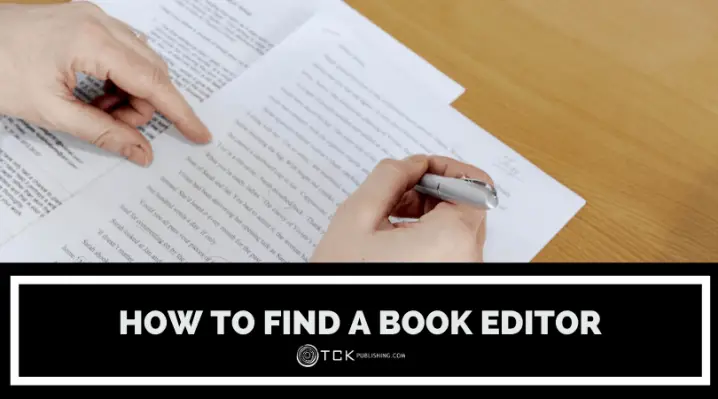
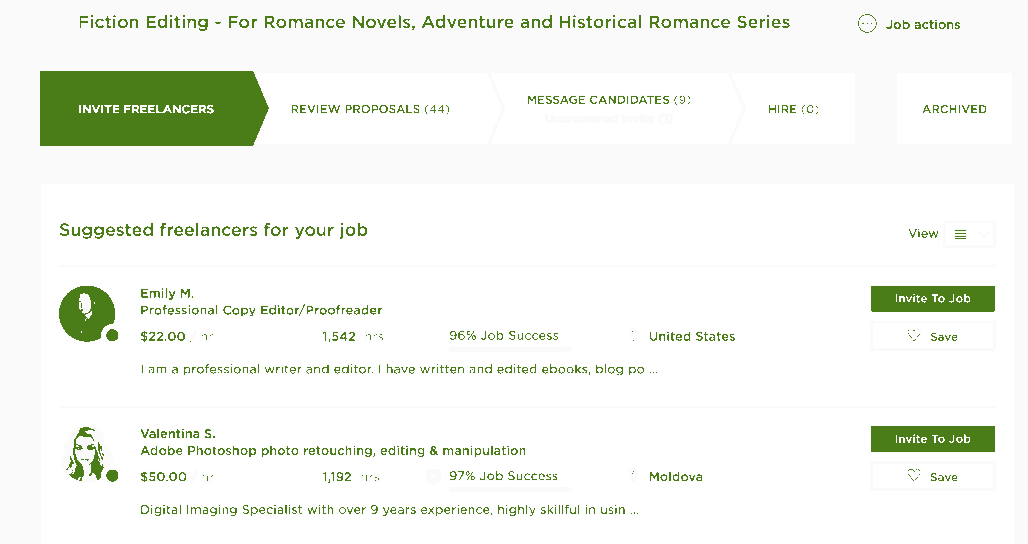

Hi,
My name is Khyali Kandpal. I have 12 years of experience specializing in Virtual Assistant for Data entry based projects related to various tasks like as:
Data entry, Email Collection, Lead Generation, Web Research, Copy Paste, Typing, Retyping Documents, Retranscript to Word Documents, Formatting, Mail Merge, Handwritten Notes, Form Filling, Web Scraping, Word, Excel, PDF Conversation, Product Listing, Image Resizing, and many more related to my task.
I deliver high-quality work on my skills. I am looking for full-time work or part-time work (if any). I can assist you with this type of work. If you have related work,
I will look forward to your answer.
Thank you.
I am brand new to the business of trying to publish. So, first of all, thank you for this very helpful website!
I am somewhere in the middle of my third revision of a 60,000 + word “cli-fi” novel and starting to think about next steps, like hiring an editor.
I did have a couple basic questions. Assuming a good quality draft, how much might I expect to pay a top-flight editor who has publishing credits that include working with well known authors? Do such editors usually work on an hourly or project basis? Might a top-flight editor be helpful in assisting new authors to connect with a quality agent and/or publisher?
Thxs very helpful tips I am ready to find editor and finish work till last step looking for all rounder person senoir citizen here it’s short story
we’re so glad you found the tips helpful! :) let us know if you have any questions
Hi Tom , I gonna publish my first ebook on Amazon thanks to the guidelines of your course on Udemy . You mentioned a lot about Fiverr for freelancers that we can use for book editing. Why don’t u mention about this site here ? Any problem I should be aware of ?
Hi Ngoa, thanks for your comment! Fiverr can be a great resource for freelance projects, but I think for larger projects like complete book editing the 3 mentioned here might be more ideal, whereas Fiverr might be great for individual projects like the cover design or layout.
I have completed an 86,000 word Christian Fiction book titled”BEHOLD – a Tale of Two Worlds.” I am interested in discovering if it is of some value as a published book, and if so how that might best be realized. It follows the life of Noah’s wife as she assists Noah in the building of the ark, survives a year’s voyage, builds a new life and civilization in a New World, meets up with Abraham, buries Noah in Haran, and continues with her pursuit of the “Line-of-the-Seed” all the way to assisting the mid wife at the birth of Moses. She lives through the Exodus all the way to the Mountain of God giving counsel and strength to the Israelite people in their times of weakness. A mystery is woven into this tale with the finding of an ax at the location where the Israelite people may have camped at the Mountain of God by a recent Archaeological expedition. It is “radioactive!” How can that Be?? The book is emailable to you.
Hi Cortland, thanks for your comment! Unfortunately we are currently closed to fiction submissions, but you might want to check out this list of Christian publishers, many of whom consider fiction stories and works like yours :)
I like to flatter myself that I don’t need the help of a professional editor and that my work is good enough with only a little polishing on any rough edges. I know I am only kidding myself. But that’s because I also know that although I can of course use one, I surely cannot afford one! I am an 81-year old pension-less retiree living off the meager income of my plain jobbed sons who have families of their own and this is my first attempt at writing a non-technical full length nonfiction inspirational book. I know the book has value and I am very flexible. I am open to selling the rights of ownership or accept a partner or sponsor. What can I do. I need advise please someone help! if the book is too strong, I am willing to tone it down. I just know I have an obligation to get it published somehow. Please read the book.
Hi Teodorico, if you don’t wish to hire a professional editor, I recommend joining a writers’ group where you can get good feedback from fellow writers. There are even online options, which you can find here: https://www.tckpublishing.com/online-writing-clubs/
Very helpfully. Is there such a thing, where a editor will do the work on your manuscript and in exchange gets to put there name to the work when the book is published, or that just happens anyway.
Gwilam,
I highly doubt any good editors would work for free just to have their name attached to a book. After all, they could just write their own book and keep all the rights and royalties from it, couldn’t they?